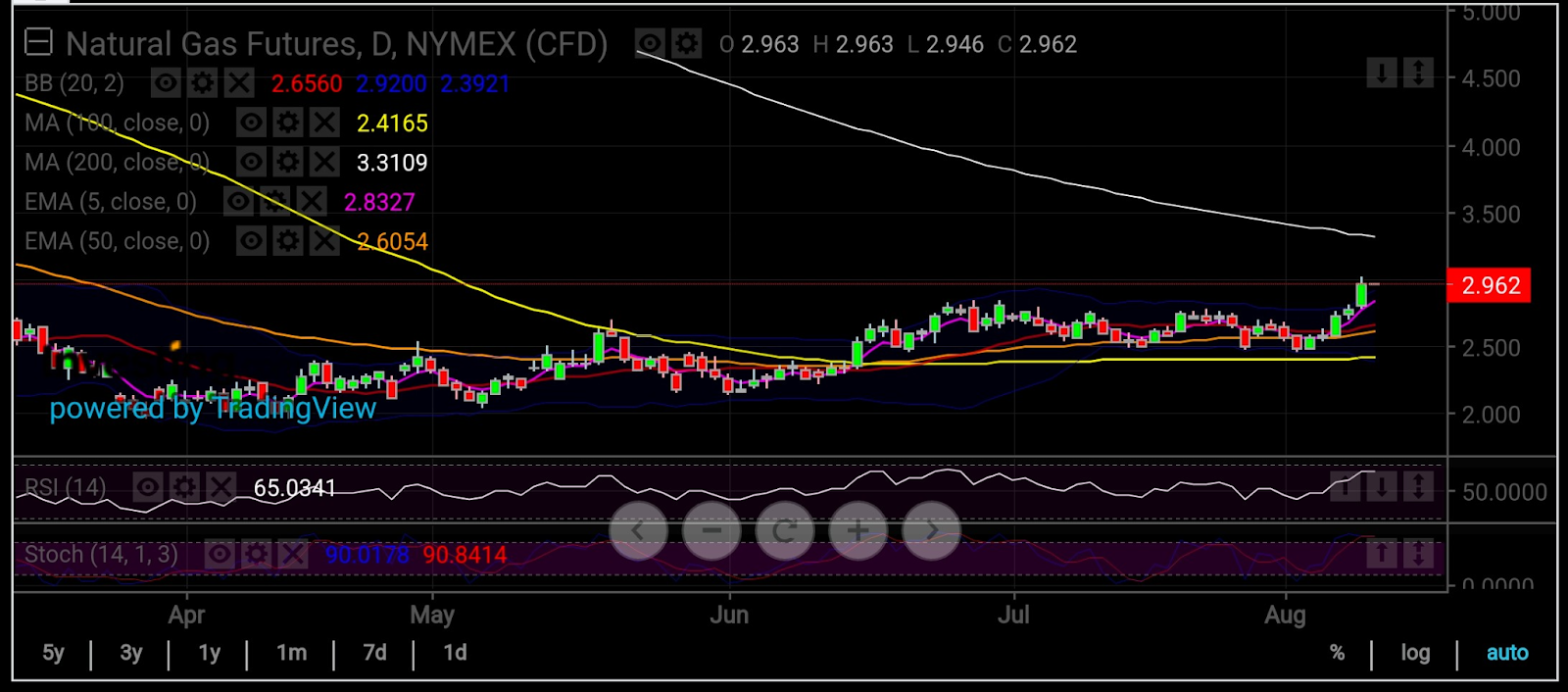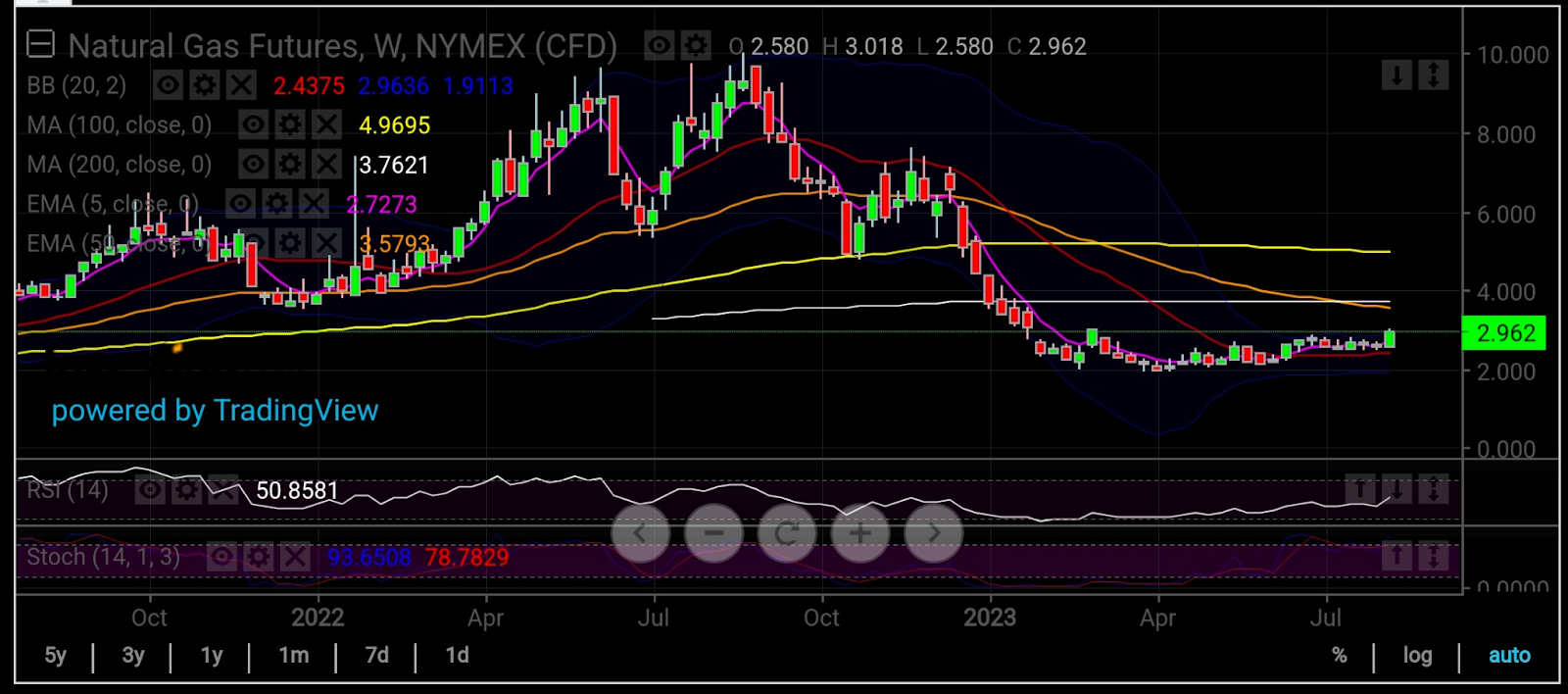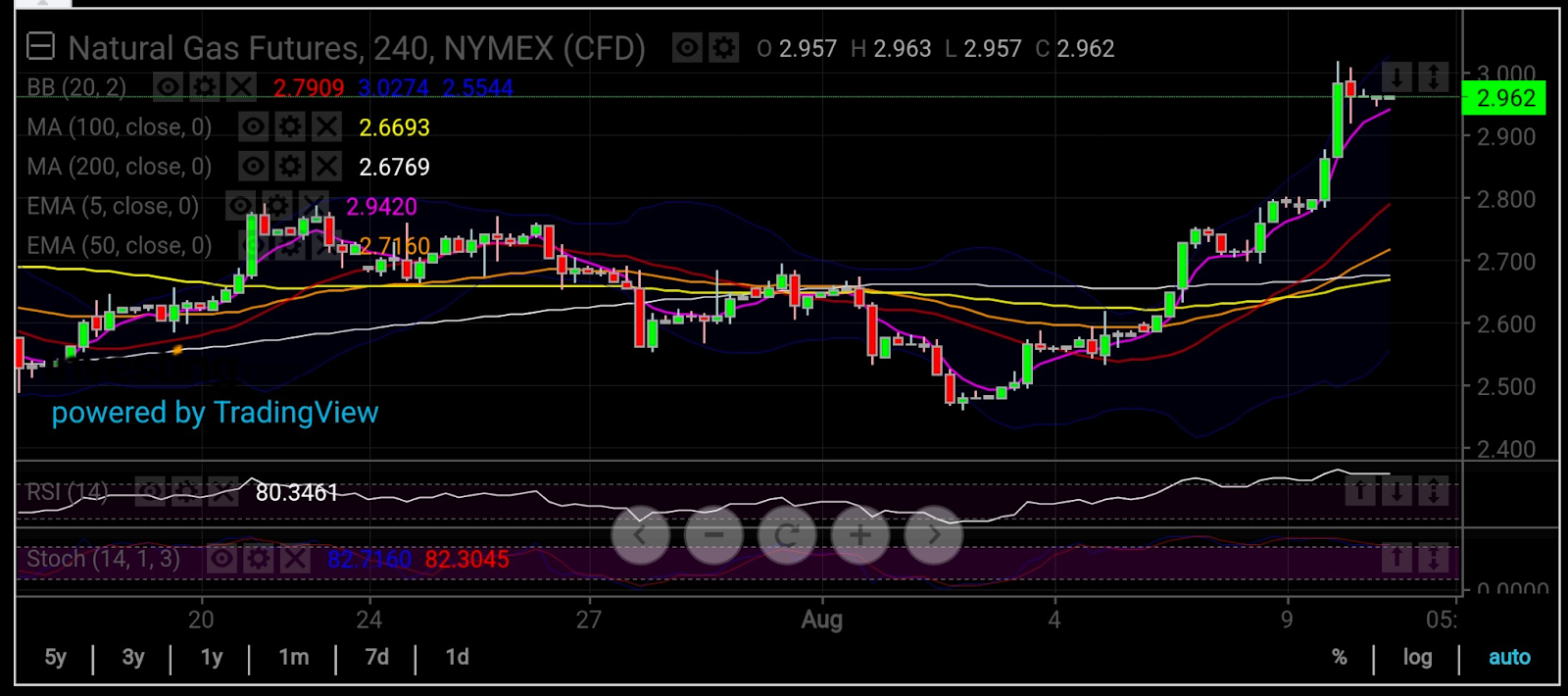Natural Gas Above $3 Is No Magic; Storage Has to Melt
2023.08.10 04:59
- In one swift move, gas futures are back at $3 after months of being trapped at mid $2
- Chart-wise, front-month September gas signals potential to breach $3.50
- Fundamental watchers say at $3, gas storage cannot stay 20% above year-ago
It took one parabolic move to achieve in a day what seemed impossible in over half a year of trading: The return to $3 pricing.
But now that it’s done, the question is where do we go from here. And, perhaps more importantly for gas bulls, what will it take to avoid a return to the mid-$2 stranglehold?
Charts suggest a breach of $3.50 in near term if the momentum holds.
A week ago, I wrote that the only real commodity gas bulls probably need now is the thing called .
That’s because baking weather in the U.S. South-Centre and power burns from air conditioners being cranked to the hilt day and night to keep up with the maddening heat still couldn’t conspire to lift prices from the $2.40-$2.70 deadlock of the past two months.
 Charts by SKCharting.com, with data powered by Investing.com
Charts by SKCharting.com, with data powered by Investing.com
That hapless state of the gas bull may have become history now, thanks to maintenance and pipeline issues that have capped daily gas production from crossing the bearish one billion cubic feet, or bcf, mark.
Insane power pricing in some parts of the US — like the 800% spike to $2,500 per megawatt/hour levied by Texas generator ERCOT — also fueled Wednesday’s move on the New York Mercantile Exchange that took the front-month September gas contract on the Henry Hub to a seven-month high of $3.018 per mmBtu, or million metric British thermal units.
In Thursday’s electronic trading ahead of the regular New York session, September gas hovered at just under $3, ranging from $2.945 to $2.998.
 Natural Gas Weekly Chart Sunil Kumar Dixit, the chief technical strategist at SKCharting.com, said chart-wise, the breakout in Henry Hub appeared to have come from “prolonged momentum accumulation and consolidation.”
Natural Gas Weekly Chart Sunil Kumar Dixit, the chief technical strategist at SKCharting.com, said chart-wise, the breakout in Henry Hub appeared to have come from “prolonged momentum accumulation and consolidation.”
He said the momentum was supported by the 5-day EMA, or Exponential Moving Average, dynamically positioned at $2.83 and “remained intact with room for some measured correction towards the breakout zone for a regular retest.” For an idea, he said support could be as low as $2.67 on the 100-day SMA or Simple Moving Average.
Dixit added:
“Above $3.01, the way is open for further gains to the monthly middle Bollinger Band of $3.25, followed by the 200-day SMA of $3.31. Major upside resistance is seen at the 50-week EMA of $3.58.”
Those watching fundamentals say that if gas is to avoid revisiting $2 lows — and this year’s sub-$3 streak is the already fourth longest of its kind since 2008 — then Rule 101 in natural gas would apply. And that is: of the fuel cannot permanently stay 20% over year-ago levels, at least for the optics of a bull market.
 Natural Gas 4-Hourly Chart Before last week’s reading on gas storage that will be made available later today, the Energy Information Administration, or EIA, reported an inventory level of 3.001 trillion cubic feet, or tcf, in underground caverns across the United States. That was 22.4% above the year-ago storage level of 2.451 tcf and 12% higher than the five-year stockpile of 2.679 tcf.
Natural Gas 4-Hourly Chart Before last week’s reading on gas storage that will be made available later today, the Energy Information Administration, or EIA, reported an inventory level of 3.001 trillion cubic feet, or tcf, in underground caverns across the United States. That was 22.4% above the year-ago storage level of 2.451 tcf and 12% higher than the five-year stockpile of 2.679 tcf.
While the current storage level may seem excessive at a glance, the truth is it has come off the highs of recent months. In mid-May, for instance, storage was 30% higher than year-ago levels and 18% above the five-year average.
Yet, analysts at EBW Analytics note that natural gas marketers “appear eager to sell off excess storage inventories into the scorching Texas heat wave, in the process clearing space to maximize attractive contango opportunities across the NYMEX curve during the autumn and into the winter.”
John Sodergreen, the author of the weekly trade journal on natural gas called “The Desk,” added to storage expectations by saying in his latest Wednesday edition:
“With overbearing heat continuing for the week ending Aug. 1 and continuing throughout the first half of August, it would not be surprising to see the regional storage surplus pared an incremental 30-40 bcf over the next trio of EIA reports into mid month.”
But he also concluded that line by saying, “Here’s hoping” — a nod to the fact that there’s little any individual could do to alter the market’s supply dynamics. If the gas in storage is to melt, it has to be from power burns and LNG shipments that must consistently beat production gains. It’s simple logic — no magic.
Said Sodergreen:
“Add to the mix that European stocks are high, prices across the pond are low and both European and Asian buyers are now trying to make sense out of a warm fall outlook.”
According to industry analysts tracked by Investng.com, storage rising by 30 bcf would bring gas stockpiles across the Lower 48 US states to 3.031 tcf, placing this year’s inventories 306 bcf above the five-year average and 536 bcf above year-ago levels for the comparable week.
Ryan Parsons of Gelber & Associates says that given the price action that’s forced market entities to reposition rapidly to $3 levels, storage has the potential to add to the market’s already notable volatility.
“While the supply-demand balance would otherwise be quite similar to last year, the heat-related demand for this storage week has pushed our estimate much lower than this time in 2022,” said Parsons.
Rhett Milne of natgasWeather.com tells us that the next two EIA storage reports are expected to print builds slightly smaller than five-year averages to further decrease surpluses to near 300 bcf. Adds Milne:
“If widespread heat can hold over much of the US for mid-to-late August, surpluses could be reduced toward 250 bcf, although the theme has been cooler trends show up in time, and that’s again the risk. It would also be helpful if the supply demand balance were to tighten, which could be accomplished through lighter production or stronger exports.”
Eli Rubin, an analyst at EBW Analytics, agrees with the outlook:
“We continue to anticipate production growth likely ebbing in early autumn due to 1. a lagged upstream response from the collapse in natural gas pricing earlier this year, 2. steep contango in the NYMEX forward curve incentivizing producers to shape their production profile in favor of delaying supply into early winter, and 3. pipeline maintenance often planned for late summer and early fall shoulder season ahead of the higher-demand Winter season.”
At a high level, Rubin says, producer earnings calls appear to reinforce his basic outlook, “although growing upstream production efficiencies are positioning producers to expand production again into calendar 2024 should higher pricing materialize.”
***
Disclaimer: The aim of this article is purely to inform and does not in any way represent an inducement or recommendation to buy or sell any commodity or its related securities. The author Barani Krishnan does not hold a position in the commodities and securities he writes about. He typically uses a range of views outside his own to bring diversity to his analysis of any market. For neutrality, he sometimes presents contrarian views and market variables.







